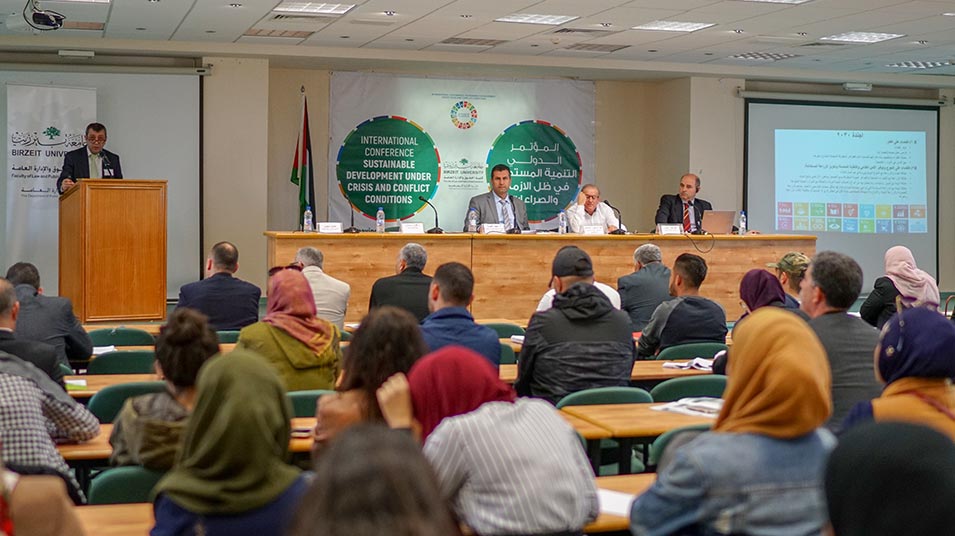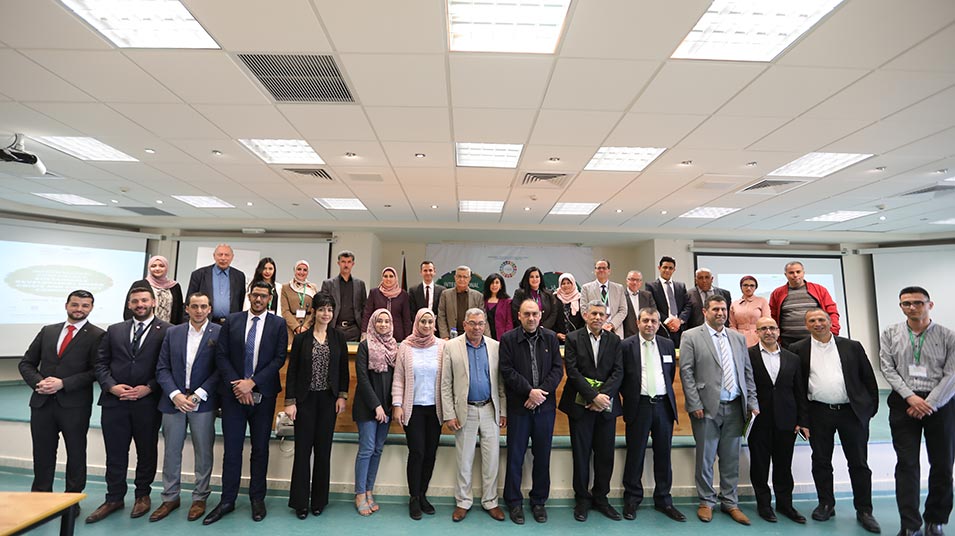International public administration conference focuses on sustainable development in conflict-ridden areas
The international conference on “Sustainable Development under Crisis and Conflict Conditions” that took place on April 23 and 24 at Birzeit University under the theme “Leaving No One Behind” has concluded. Organized by the Department of Public Administration in the Faculty of Law and Public Administration, it explored the realities and challenges sustainable development is facing in areas under conflict.
At the end of the two-day event, the attending experts and visitors agreed that the conference has highlighted a number of concerns, among them the importance of joining all local and international efforts to support sustainable development in Jerusalem, Area C, and marginalized areas to better challenge the Israeli occupation’s systematic measures that confiscate the resources needed for development in Palestine. Furthermore, the conference stressed the importance of empowering good governance and integrated management in Palestinian public, private, and civil sectors; it recommended that Palestine rely on local food production to improve sustainable agriculture and food security and drastically reduce the economic dependency on Israeli markets; and it emphasized that the Palestinian government has to work on development at the local governance level to support national development and put an end to the political fragmentation in Palestine. The concluding remarks were read by Jehad Alayasa, an assistant professor and the director of the master’s program in government and local government at Birzeit University.
The goals of the conference were two-fold. It aimed to evaluate and analyze the policies and plans by which Palestine strives to achieve the global 2030 Sustainable Development Goals (SDGs), focusing on the efforts of the Palestinian government and comparing them to similar cases in other countries that are or were under conflict; and it endeavored to provide policy makers with the opportunity to discuss, evaluate, and analyze various policies and plans, enabling them to better achieve the 2030 goals after sharing experiences and lessons learned with local and international experts.
In his opening remarks, President of Birzeit University Abdullatif Abuhijleh emphasized the role of universities in bolstering sustainable development in Palestine. He pointed to universities’ efforts in shaping future leaders of public and private institutions and in supplying the job market with competent, skillful workers who lay the foundations for the future independent Palestinian state.
Birzeit University, Abuhijleh added, has played a vital role in pushing forward the development process in Palestine by forging partnerships with national, regional, and international partner institutions and by hosting and organizing workshops, seminars, and symposiums that focus on ways to achieve sustainable development.
Majdi Saleh, the Palestinian minister of local government, raised concerns over Israel’s ongoing expansion and building of settlements, grab of land and resources, and blockade of Gaza because these measures severely hamper the prospects of achieving sustainable development in Palestine.
“Sustainable development can’t be achieved without securing the Palestinian right to self-determination through the establishment of an independent, sovereign Palestinian state,” Saleh added, calling on the international community to engage and help secure the rights of Palestinians.
Saleh explained that the newly appointed Palestinian government will work with private and civil society institutions towards achieving the goals of the UN’s 2030 Agenda for Sustainable Development, noting that each ministry - including the recently established Ministry of Entrepreneurship and Empowerment - will devise plans and strategies to help achieve each one of the 17 sustainable development goals.
Nour Mattour, chair of the Department of Public Administration, emphasized the increased need for sustainable development research in a globalized world, noting that this conference presents a chance for international and local experts, academics, researchers, and students to debate and discuss sustainable development under extraordinary circumstances.
Nabeel Kassis, the keynote speaker and Director General of the Palestine Economic Policy Research Institute (MAS), stated that the prolonged unlawful Israeli occupation of Palestine - ongoing for more than half a century, with no solution in sight - is severely challenging efforts to achieve the 2030 SDGs put forth by the UN General Assembly. Kassis questioned the possibility of achieving sustainable development in the unique context in Palestine under Israeli colonialization and occupation.
As the Palestinian government has adopted the sustainable development goal in its national agendas, MAS, according to Kassis, has issued an annex to evaluate the eighth goal, related to economic growth and labor, in the Palestinian context. He pointed out that the study reveals that Palestine is far from achieving this global goal due to an ongoing decrease of economic growth, rising rates of unemployment, and low participation rates of women in the labor market, among other reasons.
Kassis called upon the private, public, and civil sectors to work collectively towards enhancing the power of the Palestinian leadership and to strengthen its will and determination to achieve the sustainable development goals despite added challenges in the unique context in Palestine.
The first day of the conference featured three sessions: The first, chaired by Estephan Salameh, a senior advisor at the United Nations Development Programme, focused on the challenges and realities of sustainable development in Palestine; the second, chaired by Vice President of Al-Quds University Safa Nasser Aldeen, revolved around development in areas under occupation; the third, chaired by Samia Al-Botmeh, dean of the Faculty of Business and Economics at Birzeit University, discussed the role of cross-sector partnerships in achieving sustainable development.
The conference’s second day presented four sessions: The first, chaired by Jehad Al-Alayasa, director of Birzeit University’s master’s program in government and local governance, focused on the sustainable management of natural resources and on efforts to preserve the environment under crisis conditions; the second, chaired by Eyad Tayyem, chairman of the State Audit and Administrative Control Bureau, highlighted the role of cooperation and partnership-building in achieving sustainable development. Dawoud Deik, the deputy social development minister, chaired the third session that focused on the importance of social development in conflict-ridden areas that are in need of sustainable development; and the fourth session, chaired by Tawfeeq Al-Budairi, chair of the Municipal Development and Lending Fund, explored ways to achieve sustainable development at local levels in Palestine.








